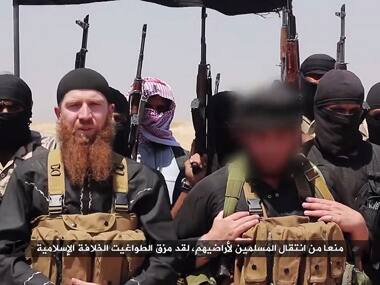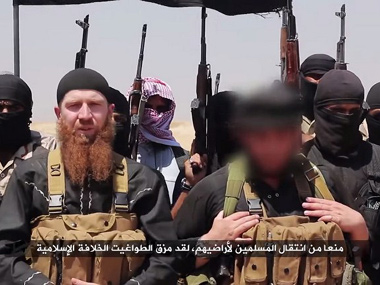Never since the end of the cold war has the world been in such a geopolitical mess. While Islamic State (IS) terrorists are stomping around in Europe, the Middle East and Africa, armed with weapons and seething with murderous rage, dogfights within the countries fighting the menace threaten to not only derail the war on terror but unleash new threats to global peace. [caption id=“attachment_2520936” align=“alignleft” width=“380”]
 Representational image. AFP[/caption] On Monday, when
Turkey shot down a Russian fighter jet
on the Syrian border, ostensibly because it violated its airspace “in spite of several warnings,” the potentially dangerous ramifications underlined how the western powers and their allies may end up fighting each other instead of Daesh (the Arabic acronym for IS). The Turkish attack on the Russian jet is of great significance. This is for the first time a Nato country has shot down a Russian warplane since the end of the cold war. Predictably, it triggered some serious sabre-rattling in Moscow and emergency meeting in Europe. Russian president Vladimir Putin has claimed that the Su-24 was hit by air-to-air missiles fired by Turkish F-16s while it was flying over Syrian territory. Labelling Ankara a back-stabber and an “accomplice of terrorists,” he has vowed retaliatory measures. The head of Russian parliament’s international committee, Alexei Pushkov, has warned of serious consequences. “Ankara clearly did not weigh the consequences of its hostile acts for Turkey’s interests and economy," he wrote on Twitter. In the British parliament, the incident led to serious question marks over Turkey’s reliability as an ally in the fight against IS. One of its Labour members argued that Turkey was propping up IS by buying its oil. “When you consider that not only today that they’ve shot down a Russian jet - who are also trying to fight Isil - they’re buying oil from ISIS in order to prop them up, they’re bombing the Kurds who are also fighting ISIS.” “This Syrian engagement is an almighty mess,” Labour’s Dennis Skinner said. In return, he was called an “apologist for Russian action” by the British foreign minister, highlighting the deep political schisms. The almighty mess The root cause of the evolving crisis, of course, is Syria, where Nato, Russia, Iran and countries in the Middle East are engaged in a bitter battle against each other, creating the grounds for ISIS to not only survive, strengthen and expand but also use the internecine battles for its own propaganda and recruitment. Nato is helping the moderate Kurdish and Sunni rebels in the ongoing civil war against Syria’s Shi’a president Bashar al-Assad. Though there are minor differences on the rebel groups to support, Turkey, Saudi Arabia and Qatar are also arrayed against Assad. Iran, the most influential Shi’a-majority country in the region, is helping Assad for sectarian reasons.
Russia is also bombing the rebels
because Assad has been its most-trusted ally for years in the region. The dangerous muddle has been complicated by the presence of IS, which not only wants Assad out but is also waging a war against the other rebels. So intricate is this web that everybody will end up harming each other’s interests and letting ISIS thrive, unless there is unanimity on who the real enemy and the need to set the civil war aside, ensure a cease fire, to first tackle Daesh and its terrorists. But, as the evolving animus between Russia and Turkey shows, the Syrian civil war, already in its fifth year, is threatening to undermine a global assault on Daesh and instead become the new flash point. Why it is a win-win for IS In spite of the French and Russian onslaught on the ‘Islamic State’, many analysts and commentators in the west are not too optimistic of quick and decisive gains. The main reasons for the pessimism are — predictably — the differences over Syria and the limited gains from the assault on IS. The ability of the IS to push more fighters on the ground in Syria and Iraq, referred to as Syraq by many because of the interlinked Daesh territory, and send out jihadis to Europe for terror attacks has made many fear that the current strategy of aerial bombing is yielding meagre results and this war may go on for decades. But the western powers are not eager to scale up the war because
this is exactly what the IS wants
. Apart from western boots on the ground in Dabiq for a decisive end-of-the-times war against Rome, the IS wants a more intense response from the West so that it can project itself as a martyr and the resulting propaganda can help it recruit more soldiers from across the world. Aware of the political and theological tightrope, the west is hoping to first limit and then finish off IS through its current strategy of bleeding it slowly, an idea that has been rejected by Russia and France, the two victims of the recent ISI terror attacks. But, the infighting within Nato, desperation in Paris, the ‘backstabbing of Russia’ is threatening to pull the war on IS in opposing directions. Only a week ago, the head of Russia’s Federal Security Service (FSB) had told a meeting of top security heads of ex-Soviet states (CIS) in Moscow on Wednesday that Islamic State evolved from the Arab Spring and gained momentum due to the duplicity of certain world powers. There are world powers that are using Islamic State as a kind of “terror battering ram” to ensure their interests in Asia and Africa, FSB director Aleksandr Bortnikov had alleged. The outcome of this global conflict could be disastrous, Bortnikov said. His words have acquired an ominous ring after Turkey’s decision to down the Russian jet and Putin’s promise of a befitting response. IS must be laughing.
Representational image. AFP[/caption] On Monday, when
Turkey shot down a Russian fighter jet
on the Syrian border, ostensibly because it violated its airspace “in spite of several warnings,” the potentially dangerous ramifications underlined how the western powers and their allies may end up fighting each other instead of Daesh (the Arabic acronym for IS). The Turkish attack on the Russian jet is of great significance. This is for the first time a Nato country has shot down a Russian warplane since the end of the cold war. Predictably, it triggered some serious sabre-rattling in Moscow and emergency meeting in Europe. Russian president Vladimir Putin has claimed that the Su-24 was hit by air-to-air missiles fired by Turkish F-16s while it was flying over Syrian territory. Labelling Ankara a back-stabber and an “accomplice of terrorists,” he has vowed retaliatory measures. The head of Russian parliament’s international committee, Alexei Pushkov, has warned of serious consequences. “Ankara clearly did not weigh the consequences of its hostile acts for Turkey’s interests and economy," he wrote on Twitter. In the British parliament, the incident led to serious question marks over Turkey’s reliability as an ally in the fight against IS. One of its Labour members argued that Turkey was propping up IS by buying its oil. “When you consider that not only today that they’ve shot down a Russian jet - who are also trying to fight Isil - they’re buying oil from ISIS in order to prop them up, they’re bombing the Kurds who are also fighting ISIS.” “This Syrian engagement is an almighty mess,” Labour’s Dennis Skinner said. In return, he was called an “apologist for Russian action” by the British foreign minister, highlighting the deep political schisms. The almighty mess The root cause of the evolving crisis, of course, is Syria, where Nato, Russia, Iran and countries in the Middle East are engaged in a bitter battle against each other, creating the grounds for ISIS to not only survive, strengthen and expand but also use the internecine battles for its own propaganda and recruitment. Nato is helping the moderate Kurdish and Sunni rebels in the ongoing civil war against Syria’s Shi’a president Bashar al-Assad. Though there are minor differences on the rebel groups to support, Turkey, Saudi Arabia and Qatar are also arrayed against Assad. Iran, the most influential Shi’a-majority country in the region, is helping Assad for sectarian reasons.
Russia is also bombing the rebels
because Assad has been its most-trusted ally for years in the region. The dangerous muddle has been complicated by the presence of IS, which not only wants Assad out but is also waging a war against the other rebels. So intricate is this web that everybody will end up harming each other’s interests and letting ISIS thrive, unless there is unanimity on who the real enemy and the need to set the civil war aside, ensure a cease fire, to first tackle Daesh and its terrorists. But, as the evolving animus between Russia and Turkey shows, the Syrian civil war, already in its fifth year, is threatening to undermine a global assault on Daesh and instead become the new flash point. Why it is a win-win for IS In spite of the French and Russian onslaught on the ‘Islamic State’, many analysts and commentators in the west are not too optimistic of quick and decisive gains. The main reasons for the pessimism are — predictably — the differences over Syria and the limited gains from the assault on IS. The ability of the IS to push more fighters on the ground in Syria and Iraq, referred to as Syraq by many because of the interlinked Daesh territory, and send out jihadis to Europe for terror attacks has made many fear that the current strategy of aerial bombing is yielding meagre results and this war may go on for decades. But the western powers are not eager to scale up the war because
this is exactly what the IS wants
. Apart from western boots on the ground in Dabiq for a decisive end-of-the-times war against Rome, the IS wants a more intense response from the West so that it can project itself as a martyr and the resulting propaganda can help it recruit more soldiers from across the world. Aware of the political and theological tightrope, the west is hoping to first limit and then finish off IS through its current strategy of bleeding it slowly, an idea that has been rejected by Russia and France, the two victims of the recent ISI terror attacks. But, the infighting within Nato, desperation in Paris, the ‘backstabbing of Russia’ is threatening to pull the war on IS in opposing directions. Only a week ago, the head of Russia’s Federal Security Service (FSB) had told a meeting of top security heads of ex-Soviet states (CIS) in Moscow on Wednesday that Islamic State evolved from the Arab Spring and gained momentum due to the duplicity of certain world powers. There are world powers that are using Islamic State as a kind of “terror battering ram” to ensure their interests in Asia and Africa, FSB director Aleksandr Bortnikov had alleged. The outcome of this global conflict could be disastrous, Bortnikov said. His words have acquired an ominous ring after Turkey’s decision to down the Russian jet and Putin’s promise of a befitting response. IS must be laughing.
Russia-Turkey fallout has turned the war against Islamic State into an almighty mess
Sandipan Sharma
• November 25, 2015, 22:48:17 IST
While Islamic State (IS) terrorists are stomping around in Europe, the Middle East and Africa, armed with weapons and seething with murderous rage, dogfights within the countries fighting the menace threaten to not only derail the war on terror but unleash new threats to global peace.
Advertisement
)
End of Article